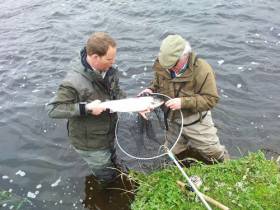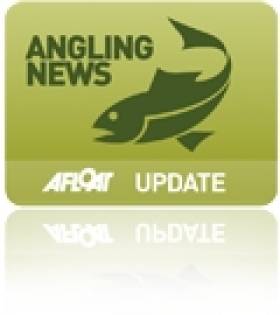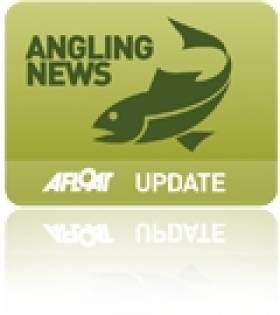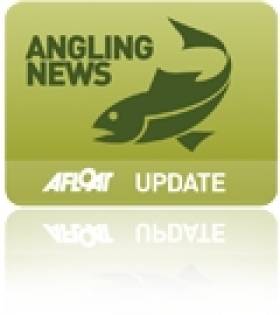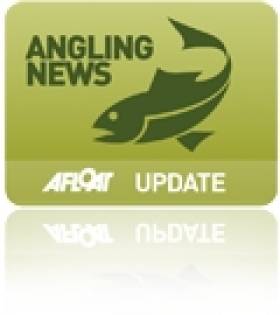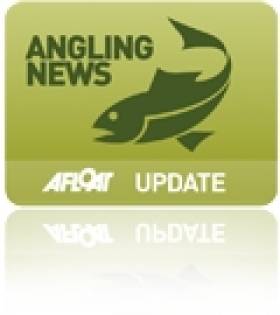Displaying items by tag: regulations
Five New Inland Fisheries Regulations Signed by Minister Ryan
Minister for Environment, Climate and Communications, Eamon Ryan has made the following order and bye-laws as of Thursday 11 April:
1. Control of Fishing for Salmon (Amendment) Order S.I. No. 81 of 2024
This order authorises the issue of commercial fishing licences by Inland Fisheries Ireland and sets out the criteria under which those licences may be issued and prescribes the maximum number of commercial licences which may be issued.
2. Galway District Conservation of Trout in the Rivers Clare, Abbert, Dalgan, Grange, and Sinking Bye-Law No. 1008, 2024
This bye-law provides for the following trout conservation measures in the rivers specified in the bye-law:
- Provides for a daily bag limit of 2 trout in the specified rivers of which not more than 1 trout is greater than 10 lbs (4.54 kgs)
- Prohibits the taking or having in possession of trout less than 13 inches (33 cm)
- Prohibits the use of more than 1 rod or 4 artificial flies when fly fishing
- Prohibits the use of more than 1 rod when dapping
- Prohibits the use of more than 2 rods or 4 artificial flies per rod when trolling
- Prohibits the use of more than 2 rods when bait fishing or spinning
- Prohibits the having on board a boat more than 3 rods when more than 1 person
- is bait fishing, spinning or trolling
3. No. 5 or Cork Fisheries District, Lower River Lee, (Sea Trout and Brown Trout) Angling Bye-Law No. 1009, 2024
This bye-law extends the annual close season for angling for sea trout and for brown trout from 14 October to 1 October each year in the waters of the river Lee and its tributaries downstream of the hydro-electric dam at Inniscarra.
The close season for angling for sea trout in said waters will commence on 1 October each year and end on 31 January in the following year, both dates inclusive and the close season for angling for brown trout in said waters will commence on 1 October each year and end on 14 February in the following year, both dates inclusive.
4. Conservation of Salmon and Sea Trout (Draft Nets and Snap Nets) Bye-law No. 1010, 2024
This bye-law sets out the opening and closing dates (and hours) for the draft net and snap net salmon and sea trout commercial fishing season in 2024 and prohibits draft net and snap net fishing for salmon and sea trout in all fishery districts except those mentioned in the schedule to the bye-law.
5. Conservation of Eel Fishing Bye-Law No. C.S. 335, 2024
This bye-law prohibits the taking, or attempting to take, fishing for or attempting to fish for, aiding or assisting the taking of or fishing for eel in any fishery district in the State. It also prohibits being in possession of, selling or offering for sale or reward, or purchasing eel caught or taken by any means in any fishery district in the State.
Wild Salmon & Sea Trout Tagging Scheme (Amendment) Regulations 2017 and Conservation Measures For 2018 Season
#Angling - Sean Kyne, Minister of State at the Department of Communications, Climate Action and Environment, gives statutory notice of his intention to make the Wild Salmon and Sea Trout Tagging Scheme (Amendment) Regulations, 2017 to provide for the management of the wild salmon and sea trout fishery by Inland Fisheries Ireland from 1 January 2018.
A copy of the draft regulations is open for public inspection at the offices of the department in Cavan and also at the offices of Inland Fisheries Ireland.
Any person may submit observations and.or objections to the draft regulations at any time during the period of 30 days concluding Thursday 14 December either by e-mail to [email protected] or to the following address:
Inland Fisheries Division
Department of Communications, Climate Action and Environment,
Elm House,
Earlsvale Road,
Cavan Town
H12 A8H7
Ireland
Tel (01) 6783071 / Lo-call 1890 449900 Ext 3071
Note that rates charged for the use of the 1890 number may vary between service providers.
All submissions received will be published on the department’s website following the conclusion of the consultation period.
Revised Wild Salmon and Sea Trout Tagging Scheme Regulations In 2015
#Angling - Minister for Natural Resources Alex White has given statutory notice of his proposal to revise the Wild Salmon and Sea Trout Tagging Scheme Regulations to apply from 1 January 2015.
The minister proposes to revoke the existing tagging scheme regulations and to make revised regulations to provide for commercial and angling total allowable catches on an individual river basis.
The draft regulations are available for public inspection HERE.
Any person may submit objections to the draft regulations at any time during the period of 30 days that commenced on Tuesday 11 November 2014 addressed to Inland Fisheries Division, Department of Communications Energy and Natural Resources, Elm House, Earlsvale Road, Cavan or by e-mail to [email protected].
Low Cost Licences To Encourage Angling Tourism Says Minister
#Angling - The Minister of State for Natural Resources has said the unchanged cost of fishing licences this year should encourage angling tourism in Ireland.
Commenting Thursday on his approval of the new regulations and by-laws for Ireland's wild salmon fishery which came into force on 1 January, Minister Fergus O'Dowd said: "Last year I lowered the cost of fishing licences and I have decided to maintain that price cut for 2013.
"I am anxious that lower costs will encourage sales of annual licences and incentivise angling tourists to avail of the Ireland’s first-class angling product."
Last week Afloat.ie reported that the Irish Times' angling correspondent Derek Evans welcomed the regulation changes for the start of this year's salmon season.
In an update to previously reported figures, conservation measures for this year involve the closure of 58 rivers due to a lack of surplus fish, down from 64 closures in 2012, while 62 rivers are open for fishing in what marks a significant rise on last year.
"This will provide opportunities for commercial fishermen and anglers to share this important resource on a sustainable basis," the minister commented.
Additionally, the Wild Salmon and Sea Trout Tagging Scheme regulations are "in essence unchanged" from last year.
New Regulations For Salmon Anglers As Season Begins
#Angling - The Irish Times' angling correspondent Derek Evans welcomes the start of the salmon angling season tomorrow with a look at regulation changes for 2013.
Among them he notes that the number of open fisheries has risen to 55, while 59 rivers - five fewer than last year - will be closed, which marks some progress in Inland Fisheries Ireland's (IFI) efforts to ensure sustainability of Ireland's freshwater fish stocks.
Meanwhile, the catch and release programme has been modified to encompass the River Liffey from Islandbridge to Leixlip Dam for the first time, although at 32 the scheme includes two fewer rivers than last year.
"Catch and release will maintain, among other things, club membership interest and ensure a good footfall on the riverbank," writes Evans.
"Provided catch and release protocols are practised correctly, research has shown that the survival rate can be close to 100 per cent."
The Irish Times has more on the story HERE.
New Harbour Charges Could End Trips to See Fungie
#IRISH HARBOURS - "Draconian" new charges for harbour users could bring an end to boat trips to see Dingle's most famous resident, according to The Irish Times.
Fungie the dolphin has been a mainstay of Dingle harbour for almost 30 years, but boat trips to visit him could cease to operate "with immediate effect" if charges of up to €9,000 are imposed "in advance" of the season.
Currently operators in the Dingle Boatmen's Association pay around €2,500 to use the harbour at the end of each season.
Association chairman Jimmy Flannery called on anyone working in tourism in Ireland to make submissions to the public consultation before the deadline next Friday 20 April.
As previously reported on Afloat.ie, yacht owners are also up in arms over the new charges proposed by Marine Minister Simon Coveney that could see their rates hiked by an incredible 800 per cent.
And the news comes not long after fellow Kerry harbour users protested proposed new bylaws to regulate their activities and impose new charges.
Kerry Harbour Users Say No to Over-Regulation
#IRISH HARBOURS - Protesters took to the water off Kerry's piers last month in an organised swim drawing attention to proposed harbour bylaws designed to regulate the activities of water users.
“We need to make the public aware they have to make submissions,” Denise Collins told The Irish Times from Kells, which hosted one of the largest swims. “Traditional activities such as swimming will be over-regulated, we fear.”
The proposed bylaws would give Kerry County Council greater control over 16 of the county's 57 harbours and piers, including Kells, Kenmare, Portmagee, Brandon and Ventry.
Under the new bylaws, strict regulations would be placed on the use of loudhailers, landing and unloading passengers and freight, waste and even movement around the harbour.
"Draconian" charges are also set to be imposed on fishermen and other harbour users, while campaingers also feel that a ban on swimming and diving could also be added to the list.
The proposed bylaws already suffered a set-back earlier this year when Kerry County Councillors decided to restart the consultation process to allow the fishing industry, tourism operators and other interests more time to make submissions.
According to the Irish Examiner, only two submissions had been received by the council as of its January monthly meeting, despite senior council officials working for months on the draft proposals.
Cllr Toiréasa Ferris commented that the proposed charges in particular "would have huge implications for fishermen, some of whom might currently be earning only between €40 and €50 for a 14-hour day."
As previously reported on Afloat.ie, charges may also soon be hiked on yachts berthing at Ireland's main fishing harbours, a list that includes Dingle in Co Kerry.
Irish Marine Federation chairman David O'Brien expressed concern at the potential for such charges to damage "the good tourism dividend for coastal towns", noting that for every euro spent on a harbour berth, €10 was normally spent in the locality.
Draft Net Season Won't Be Brought Forward Says Minister
#ANGLING - Minister for Natural Resources Fergus O’Dowd has confirmed that there is no proposal for the extension of the salmon draft netting season.
In response to concerns expressed by the angling community and highlighted by Derek Evans in The Irish Times last week, Minister O’Dowd emphasised that conservation and management of salmon and sea trout is key to protecting our valuable natural resources.
“Recent reports that the commercial season will be extended in certain rivers are untrue and I can confirm that for the 2012 season, the commercial fishing season remains as it was in all areas, with the River Suir still on a reduced season for snap fishing," said the minister.
"I am aware that confusion can arise due to the necessary extent of regulations in place. However, I am not considering any proposal for the extension of the commercial season."
The minister reminded that Inland Fisheries Ireland is the body that enforces Ireland's "extensive" fisheries legislation.
"IFI has offices throughout the country where advice can be sought. There is also a comprehensive and regularly updated website and information is also disseminated on Facebook and Twitter," he said.
Meanwhile, IFI chief executive Dr Ciaran Byrne said that the legislative code is regularly updated to ensure that Ireland's fisheries continue to be protected on the basis of information from IFI’s Standing Scientific Committee and IFI management advice.
“Only rivers with exploitable surpluses are open during the spring season and no fishery is open for commercial exploitation during this time," said Dr Byrne. "Fisheries that are classified catch-and-release or closed for salmon are now protected under bye-law 897 which prohibits the use of worms and the use of any fish hooks other than single barbless hooks.
"IFI’s priorities are maximising the return to Ireland, protecting sustainable jobs in isolated rural communities and promoting our wonderful angling resources," he added.
#NEWS UPDATE - The Irish Petroleum Industry Association (IPIA) has proposed a suite of measures aimed at tackling the problem of illegal diesel washing in Ireland.
In a statement, the industry body for Ireland's fuel industry says that the practice is costing the Exchequer as much as €155 million annually in lost fuel duty.
"While other jurisdictions have to tackle this sort of fraud, the sheer scale of criminal washing of diesel is a particularly Irish disease," it said.
The IPIA's recommendations include the introduction of "a strong regulatory regime" to control the sale of rebated fuel, a new market for off-road diesel that is harder to disguise or remove, the closure of unlicenced filling stations, and a "radical overhaul" of the currently "absurd" penalties for offending retailers.
The Irish Angling Development Alliance (IADA) has fully backed the IPIA's proposals, citing the dangers of toxic waste byproducts from diesel washing operations.
"This toxic waste has been dumped illegally across the country, where it can enter the water table, not only seriously polluting water courses but also clean drinking water supplies."
#ANGLING - Plans to bring forward the estuary draft net season "would have a detrimental effect" on spring salmon stocks, writes Derek Evans in The Irish Times today.
Evans was responding to proposals before Minister of State for Natural Resources Fergus O'Dowd to extend the draft net season from its current start date of 12 May to mid-April.
"At a time when we are beginning to see the benefits of the 2006 drift net closure coming to fruition in terms of salmon returning to our lakes and rivers," he writes, "is it not absolutely unreasonable to even consider such an application?"
He referred to anglers who have "played their part" by sticking to a "suite of regulations" introduced by the State in an effort to conserve river stocks, which include a doubling of the salmon licence fee and an annual bag limit restricted to 10 fish.
Spring salmon angling is also a significant attraction for tourism, he suggests, and any threat could damage that business.
The minister's office has issued a statement saying there no proposal currently under consideration to bring forward the start date.


























